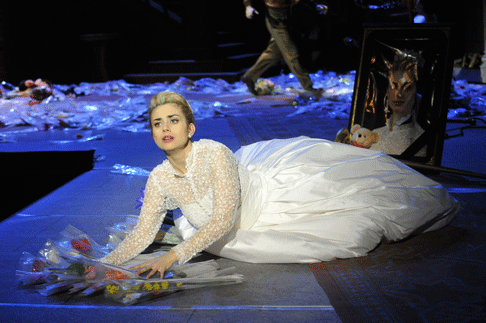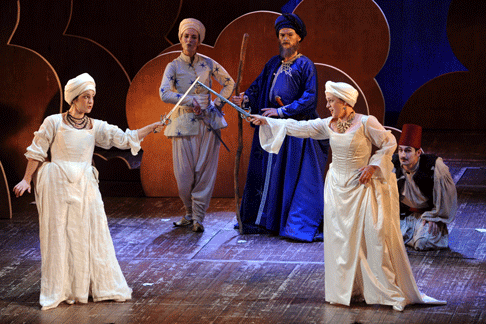It was thus hardly a surprise when Leipzig Opera approached its chief resident director Peter Konwitschny and suggested that he consider staging the Ring to celebrate the anniversary. Konwitschny, son of the late music director of Leipzig’s esteemed Gewandhaus Orchestra and among the most erudite and experienced of today’s German directors, pointed out that the Big Birthday will prompt a rush of Ring stagings throughout Germany and suggested that Leipzig consider rather new productions of four operas by Christoph Willibald Gluck, the man who late in the 18th century rescued opera from the excesses of the Baroque spectacle that it had become. Wisely, the Leipzig Opera knew a good idea when they heard one and told Konwitschny to go to work.
The director launched the project earlier this season with a new production of Alceste — or Alkestis, as it is known in Germany, which was seen at the last performance of the current season in Leipzig’s 50-year-old, 1260-seat opera house on June 18. Stagings of Gluck’s two Iphigenia operas — in Aulis and Tauris — and of Armida will follow. Konwitschny defines the common ground that will give coherence to the cycle as studies of four unusually strong women viewed from a perspective that reaches from the beginning of time to the present day. All four are dramas, he says, in which the conflict between love and power is of central importance. Konwitschny points out that the later masters of music theater — Mozart, Wagner and Richard Strauss — were all Gluck fans. Indeed, Wagner conducted Gluck and wrote about his work in his own essay Opera and Drama.
Konwitschny is a long established master of Regieoper, the practice widely spread in Germany — and now in other countries as well — of giving a director a totally free hand with a work, even if the original story is hardly recognizable in the resulting staging. What sets Konwitschny apart from other directors, however, is his regard for the composer and the story that he once told. He is there to respect — and serve — history. Yet nothing would have prepared a foreigner uninitiated in Regieoper for what Konwitschny has done with Alceste.
In his own new and original score for the opera he concludes the 1767 Vienna version with the satyr play that Gluck wrote for the Paris production of the opera nine years later. Konwitschny plays the first two acts “straight” — indeed in the majesty of their extended choruses there are markings of the sublime that one once dared expect from great art. Greek soprano Chiara Angella — a fitting choice for the heroine — sings her demonic address to the gods of the underworld with true dramatic pathos against the leaden skies projected on the rear wall of the simply-set stage. Then — with no hint of the change to come — the curtain opens Act Three in Her-Cool-TV, a television studio, in which a curly blond-wigged body builder Hercules is the host.
The chorus discards its togas in favor of jeans, colored shirts and baseball caps and sits in bleachers on either side of the stage. The studio crew feeds them their lines on posters and tells them when to laugh. The mayhem that ensues stresses the degree to which TV has corrupted modern life — and been corrupted by it. Alceste and Admetos — Belgian countertenor Yves Saelens — progressively lose ground as they argue about which of them has the greater right to die first. Finally, Apollo — dressed in the business suit of a successful politician — brings things to a happy end from the elevated loge where East-German leaders once sat at the Leipzig Opera. As the curtain falls, the reunited couple is wrapped in Saran Wrap.
 Soula Parassidis as Alceste [Photo by Andreas Birkigt courtesy of Oper Leipzig]
Soula Parassidis as Alceste [Photo by Andreas Birkigt courtesy of Oper Leipzig]
But, one must ask, where does this leave the audience, which has had an experience of riotous entertainment that few would think available in an opera house? Does one think of the dreadful turmoil Alceste has been through, when even the husband for whom she wishes to sacrifice herself questions her motives? Has Konwitschny given his audience too much of a good thing?
Despite the popularity that Baroque opera has come to enjoy, one would hardly expect a company anywhere to perform two tellings of the Alceste story on successive June evenings. That, however, is what Leipzig Opera did in offering Handel’s Admeto on June 17. (In 1745 Gluck and Handel actually met in London, where they staged a concert together. When director Tobias Kratzer took his first look at Admeto he was overwhelmed by its proximity in spirit to soap opera, which became his model for this staging.
Set in a palace that is already a museum while still serving as a royal residence, Kratzer makes the work a spoof on Europe’s surviving blue-bloods. As Alceste, for example, mezzo Soula Parassidis could be either Grace Kelly or Princess Di. Sleuthing Orindo, superbly played by Kathrin Gˆring, is an obvious take-off on Miss Marple. The progress that opera made in the years between Admeto and Alceste roughly equals the distance between the Model T Ford and space flights. Katzer understood, however, how to make the Handel superb entertainment. He diverted attention from the static quality of Handel’s da capo arias. He added a stately five-man ensemble that roamed the lobby before curtain time and then participated in on-stage action as players of the melodica, the blow organ introduced by Hohner in the 1960s. In one case, the quintet even accompanied an aria.
 Scene from Die Lybische Talestris [Photo by Gert Mothes courtesy of Oper LeipzigAdmeto memorable. (The Gewandhaus Orchestra plays for Leipzig Opera.) Alceste, the most complex character in the drama, was sung by mezzo Soula Parassidis, a coloratura of impressive agility, who touchingly followed the figure through changing modes of loss, sorrow, fury and the desire for revenge. Hagen Matzeit — Admeto — is a male alto who sings with incredible ease, as does male countertenor Norman Reinhardt, who was engaging as the king’s brother Trasimede. And petite Elena Tokar made Antigona sympathetic — despite her confusion of feelings. The cast sang the German translation by Bettina Bartz and Werner Hintze as easily as if it had been the original Italian libretto. Both operas added special flavor to the Leipzig Bach Festival that dominated the one-time home of Bach when these performances were on stage.
Scene from Die Lybische Talestris [Photo by Gert Mothes courtesy of Oper LeipzigAdmeto memorable. (The Gewandhaus Orchestra plays for Leipzig Opera.) Alceste, the most complex character in the drama, was sung by mezzo Soula Parassidis, a coloratura of impressive agility, who touchingly followed the figure through changing modes of loss, sorrow, fury and the desire for revenge. Hagen Matzeit — Admeto — is a male alto who sings with incredible ease, as does male countertenor Norman Reinhardt, who was engaging as the king’s brother Trasimede. And petite Elena Tokar made Antigona sympathetic — despite her confusion of feelings. The cast sang the German translation by Bettina Bartz and Werner Hintze as easily as if it had been the original Italian libretto. Both operas added special flavor to the Leipzig Bach Festival that dominated the one-time home of Bach when these performances were on stage.
Major curiosity of the BachFest season was the performance of Johann David Heinchen’s Die Lybische Talestris, possibly the first opera performed in Leipzig over 300 years ago. Sigrid T’Hooft, who reconstructed the score from material in Berlin’s Singakademie directed students of Leipzig’s Hochschule f¸r Musik und Theater in the production staged in the tiny Bad Lauchst‰dt theater, once directed by Goethe.
Alas, the five-hour — and somewhat slipshod — performance on the bare-board seats of the tiny Bad Lauchst‰dt proved more Baroque than most had bargained for. The theater was largely empty when — long after midnight — the curtain fell. (Allegedly, Heinrich — 1683-1729 — was well acquainted with Bach.)
One rarely hears of anyone who has gone to Leipzig for opera. It is clearly time that one does!
Wes Blomster
image=http://www.operatoday.com/OPER-LEIPZIG_3974_Alkestis-.gif
image_description=Chiara Angella as Alkestis and Yves Saelens as Admetos [Photo by Andreas Birkigt courtesy of Oper Leipzig]
product=yes
product_title=Christoph Willibald Ritter von Gluck: Alkestis. G. F. Handel: Admeto. Johann David Heinchen: Die Lybische Talestris.
product_by=Alkestis — Alkestis: Chiara Angella; Admetos: Yves Saelens; Evandros: Norman Reinhardt; Ismene: Viktorija Kaminskaite; Herkules: Ryan McKinny; Apollo; Tomas Mˆwes. Conductor: George Petrou; Director: Peter Konwitschny; Sets:Jˆrg Kosdorff; Costumes: Michaela Mayer-Michnay; Video: fettFilm
Admeto — Admeto: Hagen Matzeit; Alceste: Soula Parassidis; Herkules: Miklo’s Sebestye’n; Orindo: Kathrin Gˆring; Antigona: Elena Tokar. Conductor: Federico Maria Sardelli; Director; Tobias Katzer; Sets/costumes: Rainer Sellmaier; Lighting: Michael Rˆger
Die Lybische Talestris — Pelopidus: Dominik Grosse; Philotas: Julia Kirchner; Talestris: Amrei Bauerle; Syringa: Christiane Wiese. Conductor: Suzanne Scholz; Director: Sigrid T’Hooft; Costumes: Stephan Dietrich. Staged by students from the Leipzig Conservatory for Music and Theater.
product_id=Above: Chiara Angella as Alkestis and Yves Saelens as Admetos [Photo by Andreas Birkigt courtesy of Oper Leipzig]